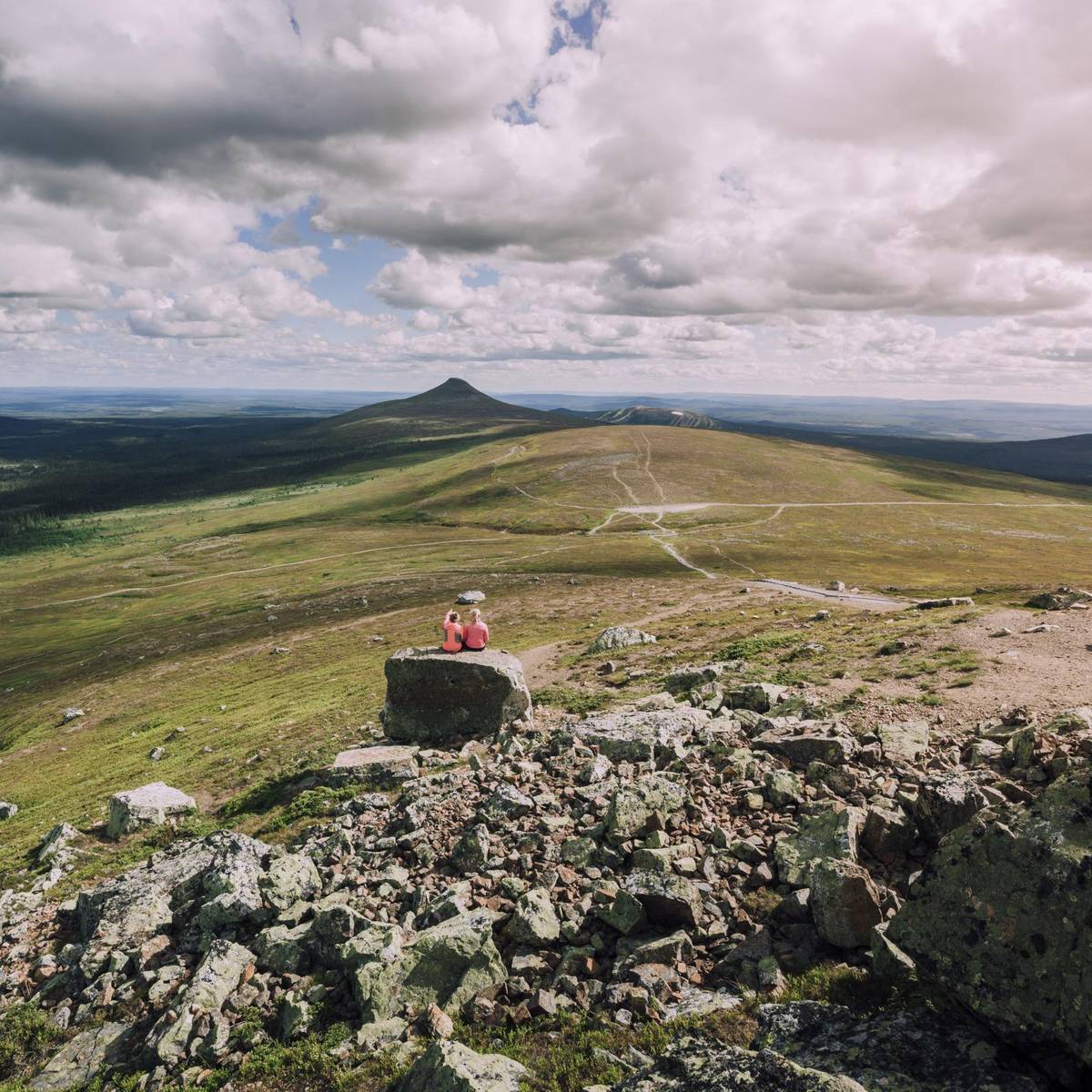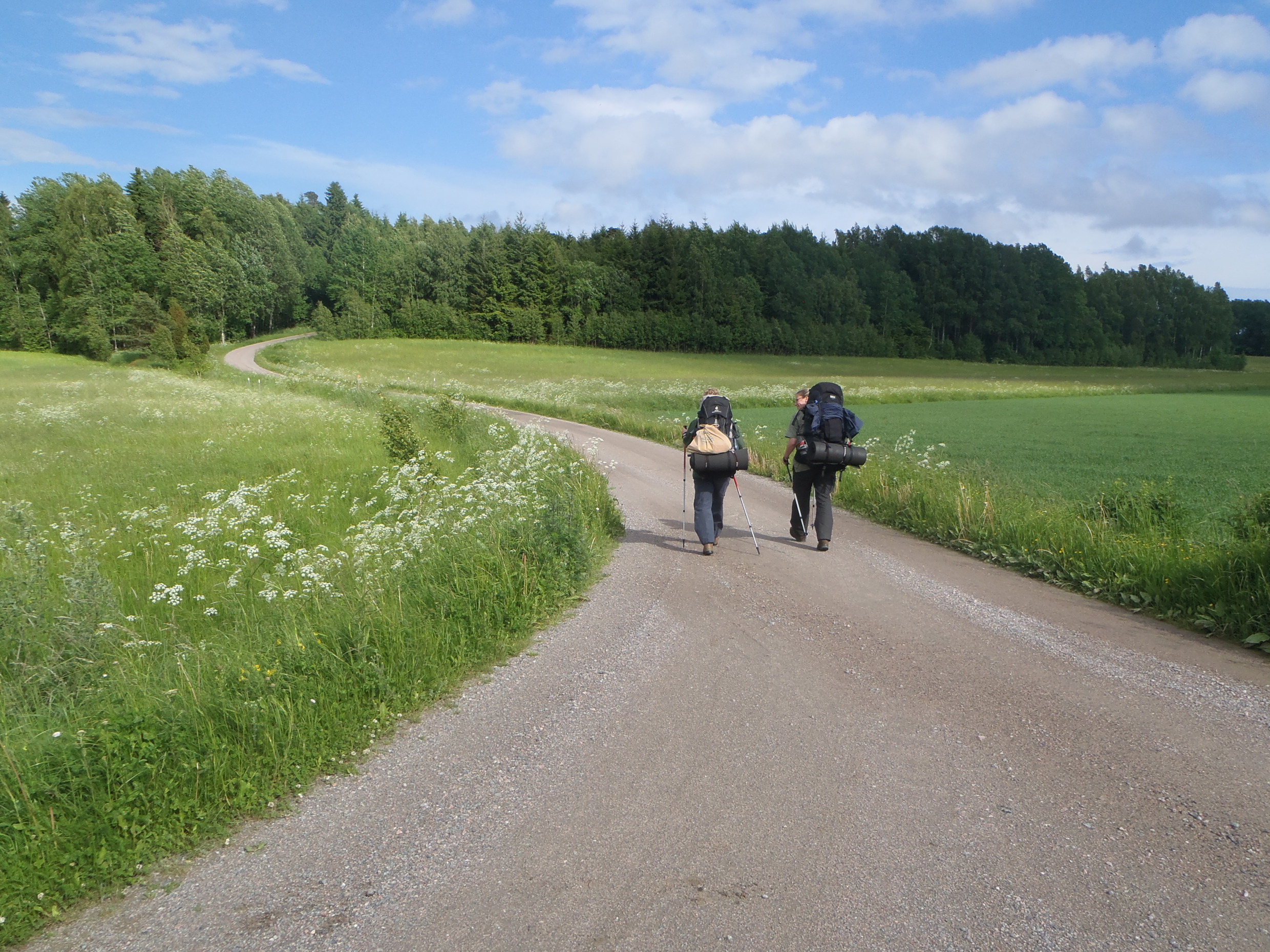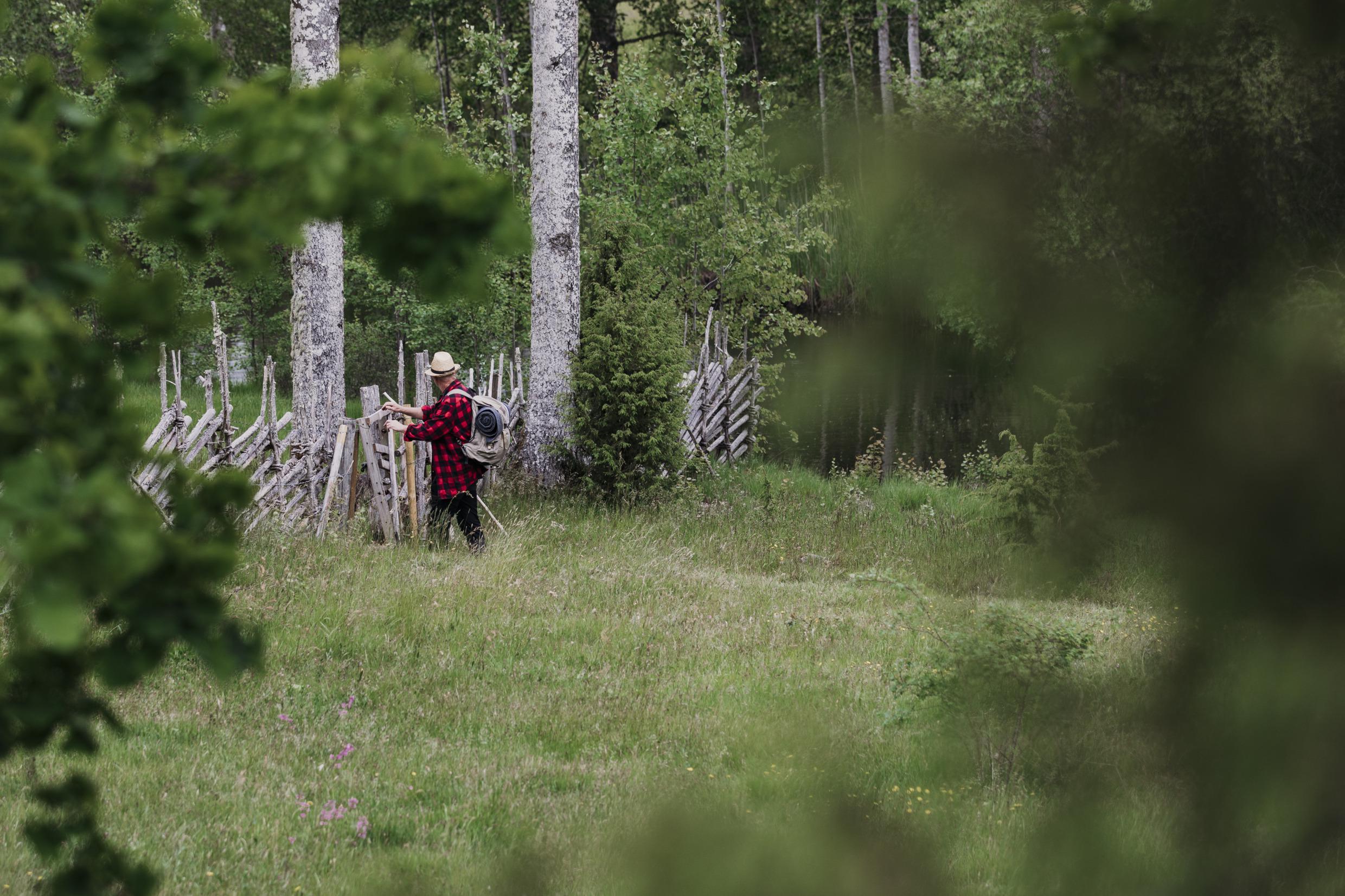
Top hiking trails in Sweden
Looking for top hiking trails in Sweden? Well-marked routes, easy to challenging hikes and gorgeous natural surroundings – here are the classic Swedish trails you just have to hike.

Looking for top hiking trails in Sweden? Well-marked routes, easy to challenging hikes and gorgeous natural surroundings – here are the classic Swedish trails you just have to hike.
Established at the end of the 19th century, the King’s Trail is considered not just one of the most beautiful hiking trails in Sweden but in the world. Stretching more than 400 kilometres through dark forests, up Sweden’s tallest mountains and along rushing rivers, the King’s Trail offers alpine landscapes – and in the summer nearly 24 hours of sunlight. While it takes about one month to hike the entire trail, you can also explore it in more manageable sections. This is helpful if you’re keen to really challenge yourself or perhaps want to hike at a more moderate skill level.
The section between Abisko and Nikkaluokta offers you the chance to scale the summit of Sweden’s highest mountain, Kebnekaise, which stands at 2 097 metres above sea level. That may sound challenging but much of this section of the King's Trail is more moderate, so know what you’re capable of and stick with it. From Saltoluokta to Kvikkjokk the hiking terrain alternates between barren plateaus and meadows surrounded by mountains and forests. This 73 km stretch takes roughly 4-5 days. Wooden steps and bridges ensure everyone's safety.
Along the middle section of the King's Trail, you’ll find the plateau of the Sarek National Park – which is often called Western Europe’s last wilderness. Did you know that Sweden was the first country in Europe to establish national parks? Sarek is one of the nine Swedish national parks that were established in 1909. You can also hike to the grandiose mountain peak Skierffe – but be careful! At the summit, the south face plummets down into a river delta. The sweeping views over Sarek National Park will make the effort worthwhile, they’re among the best views in Scandinavia. If you're looking for a less populated trail, head to the 166 kilometres stretch that runs south from Kvikkjokk.
The King’s Trail offers overnight huts every 10-20 kilometres. During the summer season, beginning in June, almost all huts are manned by wardens. Hiking in Sweden is more popular in the summer, but you can also hike in the colder months. Guided hiking tours are available during both summer and winter – and are highly recommended during the winter if you have not hiked this region previously or are not very experienced.
The Swedish Tourist Association offers a lot of different accommodations for hikers. During this particular hike you can stay at STF Abisko Turiststation, STF Kebnekaise Fjällstation or the huts in Abiskojaure, Alesjaure, Sälka, Tjäktja and Singi. The last two offers housing only (no food).
Don't forget a sturdy pair of boots and waterproof clothing during your hike on the King's Trail in Swedish Lapland.
Photo: Ted Logart/Swedish Lapland

Photo: Ted Logart/Swedish Lapland

Photo: Carl-Johan Utsi/Swedish Lapland
At 2 097 metres, Kebnekaise is Sweden’s highest mountain and while the 18 kilometre round trip to the summit and back sounds daunting it is actually suited to most skill levels. The best time to hike Kebnekaise is July and August, when the marked trail is generally snow-free. This is one of the most varied hiking trails in Sweden, allowing you to experience everything from glaciers and Sami settlements to flat gorges and wide-open valleys.
The best place to begin your hike is the STF Kebnekaise Mountain Station. STF, the Swedish Tourist Association, also maintains mountain cabins along the route.
There are two classic hiking trails leading up to Kebnekaise summit – Östra leden and Västra leden (eastern and western routes). The western trail is public and presents no out-of-the-ordinary hiking difficulties other than length, while the eastern trail is shorter but does require some climbing skills. The eastern route is also guided, weather permitting.
When hiking Kebnekaise it’s important to have a good pair of hiking boots, as well as appropriate clothing. The weather changes fast and because this is above the Arctic Circle it’s not necessarily going to be warm, even in the summer. Additionally, the mosquitos are hungry, so bring mosquito spray. It’s also a good idea to check with the guides at STF Kebnekaise Fjällstation (Mountain Station) before heading out to ensure your own safety.

Kebnekaise is the highest mountain in Sweden, and an appreciated hiking destination.
Photo: Mats Hagwall/Unsplash
The Santiago de Compostela Pilgrim Route might get more press but don’t count out the St. Olavsleden Pilgrim Trail. It passes through both Sweden and Norway and is the northernmost pilgrim trail in the world.
St. Olavsleden follows in the footsteps of Norway’s King Olav Haraldsson, who walked from Sweden to Norway almost one thousand years ago. This Scandinavian hiking trail is nearly 600 kilometres long, extending from the Baltic Sea in the east to the Atlantic Ocean in the west – or, in other words, from Selånger in Sweden to Trondheim in Norway. Taking you through vast swaths of forest, over mountains, and around lakes, St. Olavsleden is a historical and cultural marvel set in some of the most stunning scenery you’ll ever pass through.
If you want help to organise accommodation, transport and food, you can book a packaged tour. If you’d rather arrange the hike yourself, you can easily access interactive maps. There are also trail ambassadors who are happy to share their experiences with you. Accommodation is available along the way, from upscale hotels to rustic huts. Camping is also an option, and for food, you can either bring your own, shop at a grocery store or try one of the many restaurants along the trail.
The weather is extremely variable so consider that when preparing for your hike. Layers that are easily added or removed, as well as sturdy hiking boots, are your best options. Weather forecasts can be obtained from SMHI - weather in Sweden.
For detailed tips on what to pack and what equipment you might want to bring with you, read more at The Mountain Safety Council of Sweden (Fjällsäkerhetsrådet): Recommended outdoor equipment on the mountain.
The 580 km long St Olavsleden Pilgrim Trail runs from Selånger in Sweden to Trondheim in Norway.
Photo: Nils Jakobsson, Bildbyrån

Photo: Nils Jakobsson, Bildbyrån

Photo: Nils Jakobsson, Bildbyrån
If you're looking for a more comfortable hike in Sweden that still offers some challenges and plenty of beautiful surroundings, Sörmlandsleden – Sörmland Hiking Trail – is right up your alley. Located in Southern Sweden, this popular hiking trail offers more than 1,000 kilometres of varied landscape, as well as a number of places that are of cultural and historical importance.
The route is divided into nearly 100 sections that range from 2 to 21 kilometres, offering levels of difficulty that range from quite challenging to an easy hike along level ground. And like most other long hiking trails in Sweden, there are a number of exit and entry points. On Sörmlandsleden most of these are easily reached by car, bus, or train. Some sections take just a few hours to hike, while others will take the entire day.
The trail has a highly diversified natural environment: one moment you are hiking across a wide-open landscape, and the next you’ll find yourself in a dark forest or maybe enjoying the sunshine along the coastline. The trail takes you past no less than 80 lakes, where you are free to take a refreshing dip.
Lantmäteriet Ordnance Survey maps are available at tourist offices and book stores, but note that because of unexpected events, such as road building or maintenance, the actual trail may deviate from the map. And while there are overnights huts dotted along the way, there are long stretches where you won’t find any, so if you plan to overnight bring appropriate provisions and camping gear. You are allowed to camp according to Sweden’s Right of Public Access (Allemansrätten), which means you can hike anywhere you want – as long as you leave your surroundings the way you found them and you’re not disturbing anyone. There are also plenty of hotels, inns, hostels and B&Bs along the way.
Sörmlandsleden is one of the longest hiking trails in Scandinavia.
Photo: Trosa stadshotell

Photo: Trosa stadshotell

Photo: Karin Reibring/Sörmlandsleden
The 110 km long Emigrant Trail (Utvandrarleden) is a historical Swedish hiking trail in the region of Småland. It takes you through the villages from which many Swedes left to seek their fortune in the United States between 1850 and 1910.
The hard and rocky ground made it difficult to grow crops, resulting in starvation that drove, by some estimates, nearly a third of Sweden’s population to seek a better life in the “New World” in the United States. Vilhelm Moberg, a native of Småland, wrote about the emigrants’ experiences in a series of four novels, which remains a popular and poignant tale both in Sweden and abroad.
Some of the Swedish villages playing an integral part of the narrative in the books are found along the Emigrant trail, including Ljuder, Långasjö, Korpamoen, Moshult, and, most importantly, Duvemåla, where one of the key characters, Kristina, hails from.
For overnight stays along the trail, hikers can choose from a wide variety of accommodation. And you might want to tuck the Moberg novels into your pack to read as you make your way from village to village – getting a deeper understanding of the history of this Swedish region.
The Emigrant Trail (Utvandrarleden) in Småland. 130 km of winding paths and roads through the region from which a lot of people left for the United States in 1850-1910. The landscape reminds you of the hard conditions for farming back then.
Photo: Alexander Hall

Photo: Alexander Hall

Photo: Alexander Hall
The Skåneleden trail will take you through lush forests and over woodland streams.
Photo: Mickael Tannus/visitskane.com

Photo: Mickael Tannus/visitskane.com

Photo: Mickael Tannus/Tourism in Skåne

Photo: Apelöga/imagebank.sweden.se

Photo: Mickael Tannus

Photo: Apelöga